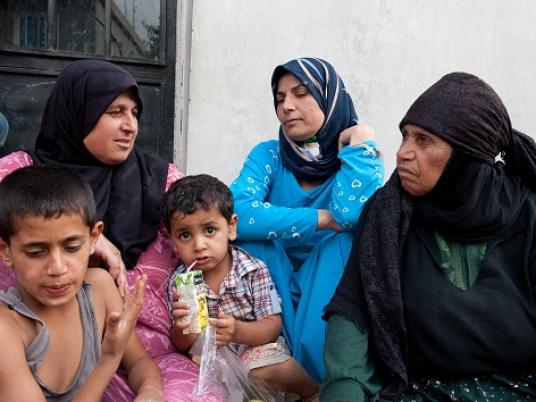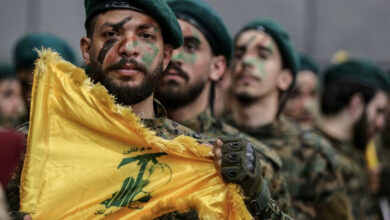
WADI KHALED, Lebanon — Since the start of the uprising in March last year, tens of thousands of Syria children have arrived as refugees in northern and western Lebanon, near the Syrian border.
While some men fled to Ersal, located in the Beqaa region in eastern Lebanon, most who fled to Wadi Khaled in the northern part of the country are women and children. Their male relatives have mostly been either killed in the conflict or are partaking in the fighting.
They leave behind the children of the Syrian war and those who will be in charge to rebuild the future of their country, if and when they return. In Wadi Khaled alone, fleeing refugees are estimated to be in the thousands.
Many of those who came from Homs and Qseir in Syria are sons and daughters of polygamous marriages, which explains how a group of 20 refugees are members of one family, with two wives of the same husband and an average of 10 to 16 children with them. The prevalence of polygamy in the Syrian countryside only aggravates the problem — a martyr, once the main breadwinner, would likely leave behind more than a widow and a dozen of orphans behind.
This is the case of Mouna and Hanan, whose husband was killed in the war. Together, both women have 15 children, and three have died in the fighting.
“My son went to buy some medication. On his way back, a shell hit him and reduced him to pieces. I couldn’t see what was left of him,” says one of the mourning mothers.
Twelve-year-old Malak is a shy and pale girl from Homs. Her father was killed by the Syrian army a few days ago.
It has been almost two years since Malak last went to school.
“The Syrian army occupied our school and used the premises as a base, so we had to stop attending lessons,” she says. Hundreds of schools have been occupied by the Syrian army and their adversaries in the militarized revolution, the Free Syrian Army, sending hundreds of children home for more than a year.
For the past three months, Malak has been sleeping at Amayed School in the village of Rami in Wadi Khaled with 50 other Syrian refugees, mostly children. She sleeps on a mattress on the floor of a balcony from which she can see the closest Syrian village. In the mornings, she sends nostalgic gazes to the other side of the border.
Nostalgia aside, Malak rarely smiles, as nightmares give her only five hours of sleep every night.
“I am afraid they come for me,” she explains, while keeping her sight toward the Syrian village across the border.
Asked about who would come get her, she immediately responds, “The army. They will come and kill me too.”
Her fears are not totally unfounded. With the fighting in Syria spilling over to north Lebanon, a country with a weak central command and army, the intensity of the war can be felt just as much in some border areas here. Reports have shown the Free Syrian Army is deploying and training in Wadi Khaled, which has prompted a response from Syrian army, turning the area into a proxy for the conflict.
“We were shelled on Lebanese soil and a young woman died. The kids got very nervous when they realized that, even in Lebanon, they are not safe from shelling,” says one of the refugees in Wadi Khaled.
Children sit around the clock, listening to their mothers talk about the war, the martyrs and the destroyed houses. They barely talk about their thoughts and their feelings to anyone. Having seen too much, women do not censor their speech in front of the children, who look nervous each time they hear the word shahid, or martyr.
Tamam, Malak’s 80-year-old grandmother, recalls how times with Hafez al-Assad, President Bashar al-Assad’s father and the late president of the war-torn country, were better. She pats Malak’s head.
“This one is the daughter of a martyr. Her father was killed two days ago by the Syrian army,” she says.
Along with her daughter and granddaughter, they represent three generations who lived through a modern Syria, under Hafez and Bashar al-Assad, and will live through the yet unknown future of the country.
Next to them, Roula is mourning her second son, who died few days ago. She became a widow of the revolution, giving three of her male relatives to the war, including her husband.
She still has 14 kids who are alive, but “each one is precious,” she says.
“The Free Syrian Army registered me as widow of a rebel. Maybe once the revolution is over, we will get some help or pension,” she says.
“Some women received up to US$2,000 for each martyr,” adds one of the other women, in a hopeless attempt to give Roula ways of thinking about compensating her loss.
Nazha was less lucky. She would have preferred a husband she could call a martyr, but instead, her husband left her and their three kids and fled with his first wife and children. Terrified by the bombings, she one day grabbed her children and fled.
She was guided by a convoy of refugees that led them to the Lebanese village of Ersal where a local family hosted them. Her children are too young to work and she left all her possessions behind. The promises of the war remain oblique for Nazha and others like her, who are likely to become vagabonds in a post-war Syria.
Some of them, such as 3-year-old Leila, have lost both parents and were separated from their siblings.
“The poor kid was crying in the arms of her dead mother in the middle of gunfire. Some passersby rescued her, and she has been moving from family to family until we find the way to get her brothers here,” says Neriman, a refugee taking care of her temporarily.
Many of the children want the Syrian president to leave and agree that the rebellion will succeed. But none of them remember the last time they went to school, or where they last heard their older siblings were fighting. They can’t guess when a teacher will again show up in their lives or when they will return to their houses.
They jump with the backfiring of the motorcycles of the village. The memories of constant shelling back home are still very much alive and can still be heard from Wadi Khaled.
With September on the doorstep and school set to start again, Amayed School will have to resume classes. These women and children will have to resettle somewhere else.



